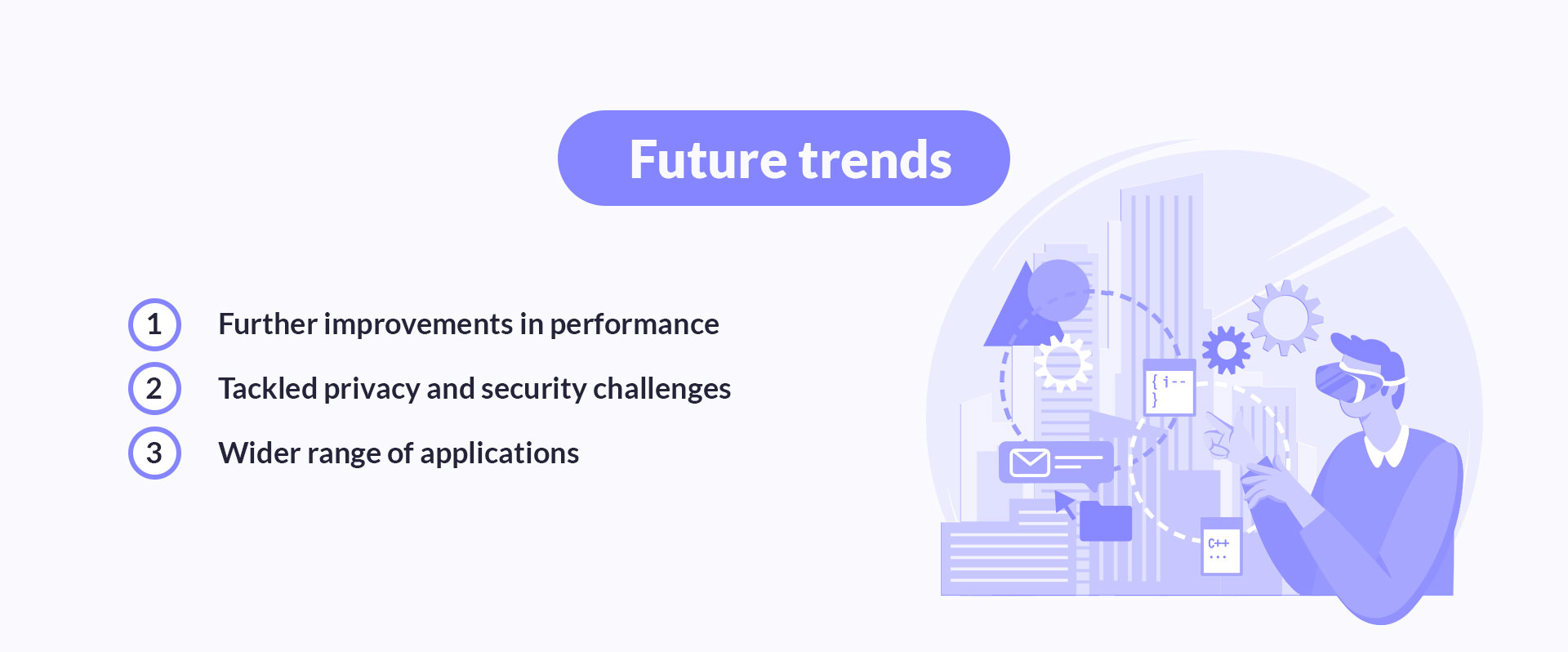What is enterprise AI, and how do companies use it for their business goals? Enterprise AI software helps large organizations achieve digital transformation using artificial intelligence technologies. In simpler terms, it’s software that helps enterprises automate processes, save time, and cut costs while increasing efficiency.
The global market for enterprise AI is $25.19 billion, and Mordor Intelligence expects it to reach $204.79 billion by 2029, with an astonishing compound annual growth rate of 52.17%. So, we’ve entered the fourth industrial revolution, dominated by AI and machine learning.
“AI/ML are the most fundamental technology change that enterprises have seen since the beginning of computing itself,” says Holger Mueller, the Principal Analyst and VP of Constellation Research.
Keep reading to learn why!
In this article:
Current challenges in traditional business processes
Traditional business processes are becoming obsolete. Take, for example, manual data entry. How quickly and accurately it’s done depends on the human. So, you can end up with a job half-done or not done at all, missed deadlines, and inaccurate data.
Here are the top three challenges in old-school business processes today:
Time-consuming manual tasks.
According to McKinsey, 60% of occupations can automate a third of their tasks. This means a third of the employee’s work hours is otherwise wasted. Add to that the possibility of errors due to fatigue and lack of motivation. Businesses can automate multiple tasks using AI models. These tasks include document processing, data entry, inventory management, and customer support. With AI virtual assistants, companies can cut 30% of their customer service costs. This is thanks to language models, speech recognition, and natural language processing.
Difficulty in aligning resources with business priorities.
Business operations depend heavily on the effective use of resources. Resource constraints and changing business goals can be detrimental to a business. In the past three years, 85% of companies had to change business strategies due to market volatility. So, it may be difficult to distribute resources where they’re most needed effectively. And without the help of AI models, predictive analytics, and machine learning, vital resources may be spent on low-priority tasks.
Lack of access to real-time, data-driven insights.
Not having the right information at the right time leads to poor business decisions. Companies that rely on manual data collection and entry may not have accurate data. That’s why data scientists usually spend 80% of their time cleaning up data for use. Worse yet, they may not notice patterns AI models would pick up on. Without AI tools, it can be difficult to monitor performance, market trends, and resource use in real time. And with no performance indicators from enterprise AI, it’s even harder to streamline operations.
With these challenges, it’s easy to see why 80% of businesses implement machine learning and AI technologies. Traditional business models must transform because of competitors, market dynamics, and customer expectations.
Being old-school will not keep your business afloat, no matter how long your tradition is. Without enterprise AI applications, you can have:
Inefficient resource allocation
Decreased customer experience
Low employee retention and satisfaction
Ineffective marketing strategies
Inconsistent process performance
Poor financial management
Pressure from the competition
Uninformed decision-making
In your AI strategy, exploring AI-enabled enterprise software should be a priority. Customers want instant results, workers want meaningful work, and competitors want to outshine you. All this forces AI adoption on business leaders.

More on the topic
Why an AI-driven knowledge management system can be a game-changer for enterprise?
Discover how AI-driven knowledge management transforms enterprise operations in today's business landscape.
Read moreCapabilities of enterprise AI in streamlining business processes
Artificial intelligence in enterprise solutions can have a profound impact on organizations. Modern processes powered by AI systems and cloud computing are efficient, innovative, and strategically oriented.
Here’s an overview of how AI for the enterprise can affect a business:
Business aspect | AI capabilities | Outcome |
Day-to-day operations | Automates routine tasks that are repetitive and time-consuming. Allows organizations to streamline processes and reduce manual errors. | Cost savings, faster workflows, and improved productivity. |
Resource allocation | Enterprise AI allows organizations to allocate resources more efficiently and focus human intelligence on more strategic and creative aspects. | Improved cost-effectiveness, higher profitability, and competitiveness. |
HR management | Assists in recruitment, employee engagement, and talent management. Helps to identify skills gaps and improve workforce planning. | Improved HR processes, employee experience, and alignment of human resources with business goals. |
Market analysis | Enterprise AI uses predictive analytics and statistical models to forecast future trends, market conditions, and risk assessments. | Better preparedness for market changes, reducing risks and maximizing strategic initiatives. |
Supply chain management | Optimizes supply chain processes by predicting demand, improving inventory management, and enhancing logistics. Enables real-time tracking and efficient resource allocation. | Reduced costs, minimized disruptions, and a more agile and responsive supply chain. |
Security and fraud detection | Identifies patterns of fraudulent activities in real time. Enhances security measures by detecting anomalies and potential threats. | Strengthened cybersecurity, reduced financial losses, and enhanced trust among stakeholders. |
Innovation | Enterprise AI fuels experimentation and testing of new ideas for changing market trends. | Improved competitiveness, better market differentiation, new business opportunities, and ability to respond to customer needs. |
Decision-making | Analyzes vast datasets to provide actionable insights. Enables making data-driven decisions. | Agile business strategies for improved decisions and results. |
Competitiveness | Enterprise AI can use data to fuel insights, innovation, and operational excellence. Serves to set companies apart in the marketplace. | Better competitiveness, market differentiation, and consistent growth. |
Improving customer experiences | Enables personalized customer interactions through customer data analysis. AI-based virtual assistants improve customer service and engagement. | Improved customer service, satisfaction, loyalty, and a competitive edge in the market. |
So now you know how deploying enterprise AI can automate and improve all aspects of your business. But it gets even better!
Step into the world of workflow automation.
Workflow automation lets you optimize and automate entire processes, not just single tasks. You will define your steps or tasks and set logical rules to progress through them. Once a workflow launches, your enterprise artificial intelligence solution will complete all the tasks within it without human intervention. That’s why Cisco Systems automated its CRM process. The result was $270 million saved per year in operating expenses.
Here are a few other benefits of process automation with enterprise AI solutions:
Employees can work on more complex tasks,
AI tools reduce or eliminate errors,
Execution becomes more reliable,
Communication and collaboration improve,
There’s a clear audit trail for compliance,
It’s more scalable,
Customer experience improves.
Implementing enterprise AI case studies
Let’s see how AI in the enterprise setting works. Join us as we explore how three organizations used AI systems for process automation.
Automating routine tasks with RPA: Air France-KLM
Air France-KLM partnered with UiPath. The goal was to automate data entry, invoice processing, and HR onboarding. These tasks were time-consuming and prone to errors. UiPath provided a robotic process automation (RPA) platform. The platform streamlined and automated these tasks to improve efficiency.
Using machine learning platforms and AI models, they worked to create bots that can mimic human actions. Then, they trained those bots to interact with different systems and complete tasks. The advantage of bots is that they are more precise than humans in repetitive tasks. And they work non-stop.
They launched the AI enterprise solution to extract and validate data and generate reports. As a result, Air France-KLM got a 610% ROI within the first year in their Budapest branch. They reduced the error rate and improved employee productivity by freeing 15 full-time employees to focus on more meaningful tasks 40 hours per week. The processing time for workflows was also reduced.
Replacing manual work with AI work, Air France-KLM saved time and increased revenue and productivity.


Thank you for Subscription!
Optimizing supply chain management with predictive analytics: Walmart
Enterprise AI, predictive analytics, and statistical models helped Walmart manage its resources and improve decisions.
They have locations in 24 countries, millions of employees, and a robust supply chain. So, managing stock and human resources is daunting. Walmart opted for an AI enterprise solution that employs machine learning models to handle complex business operations.
Predictive analytics uses sales data, seasonal trends, and external factors like weather patterns to forecast demand. This helps Walmart optimize inventory levels, reduce holding costs, and minimize stockouts.
It further helps in optimizing the supply chain by:
Predicting potential disruptions,
Managing transportation routes, and
Reducing lead times.
Enterprise AI ensures products reach stores on time. This minimizes delays and improves overall supply chain efficiency. As a result, Walmart’s AI systems yielded a 10% increase in overall revenue and a 15% reduction in inventory holding costs. Also, sentiment analysis showed a 20% increase in customer satisfaction.
When added up, the gains are significant. According to a report by McKinsey, advanced data gathering and re-processing can improve operating margins for retailers by 60% or more. So, Walmart also combined AI tools with data science and machine learning to stay competitive. Their data-driven pricing decisions led to a 5% increase in profit margins.
Cutting costs and reducing downtime with advanced data collection: GE Aviation
General Electric Aviation also uses AI models to stay on top in the aerospace industry. They implemented advanced enterprise AI systems to improve the reliability of their aircraft engines. They developed a predictive maintenance system. So, now, they don't have to rely on scheduled maintenance to address problems.
Using sensors on their engines, they collect real-time data. Sensors monitor temperature, pressure, and vibration. The vast amount of data from each flight would be impossible to analyze in time for actionable insights by data scientists. GE Aviation developed AI algorithms to clean up and analyze raw data. The data then provided insights into the engine's health and performance.
With enterprise AI, they cut unscheduled maintenance issues by 20% and maintenance costs by 15%. Simultaneously, their engines became more reliable and efficient, leading to a 20% decrease in fuel consumption.
More qualitatively, their business operations benefited from optimized maintenance schedules, plane availability, safety, and passenger satisfaction.
Things to consider before incorporating enterprise AI
Enterprise AI can bring many benefits to organizations, but its implementation can initially be challenging for business users. AI adoption will trigger many changes in processes and workflows. So, before adding AI applications to your operations, you need to work on your current systems.
Whatever AI models you plan to implement, note that they will work only as well as their data pools. To be successful in your digital transformation, integrate your existing software systems with your AI enterprise solution. Machine learning and deep learning algorithms need to interact with your current software. To do this, you will need legacy systems and APIs.
The next thing to consider is data security. Transforming into a digital enterprise requires robust cybersecurity measures. Cyberattacks and data leaks are becoming more prevalent. To protect your systems, you can:
Encrypt data and control access to it,
Implement monitoring systems and regular risk management audits,
Employ data anonymization for sensitive customer data,
Secure AI models and conduct adversarial training.
If these seem like complex tasks, you’re not alone. Many companies opt to outsource enterprise AI implementation to experts. System integration, compliance, and data protection regulations are vital concerns. If you want to reap the benefits of large language models, generative AI, deep learning, and other AI applications, the AI experts at Geniusee can help. Our full-cycle AI software development services are tailored to your business needs, aiming to empower your digital transformation.
Future trends in enterprise AI for business operations

The future of enterprise AI is looking bright. With an increased adoption rate and the potential for integration with other emerging technologies, AI applications are getting more versatile and robust.
With broader integration of AI services in a wide range of processes, algorithms and models will continue to evolve. We can expect three main things:
Further improvements in performance
Tackled privacy and security challenges
Wider range of applications
For example, combining AI with IoT can lead to smart and predictive IoT, improving resource efficiency across industries. In the blockchain niche, AI can improve fraud detection and data verification. This will lead to more secure transactions. In the virtual reality (VR) niche, AI will improve personalization and, thus, user engagement.
Future directions also include enterprise AI integration with quantum computing for solving complex problems.

Some insights for you
NLP in corporate education: 4 use cases that are redefining corporate learning
Explore how NLP is transforming corporate education with these 4 use cases, redefining the way companies approach learning and development.
Read moreConclusion
More business users are interested in generative AI, custom AI platforms, large language models, and modern solutions to everyday business challenges. Enterprise AI services are rising as they can improve efficiency, cut costs, and reduce errors through workflow automation. Now, you can answer the question, what is enterprise AI? You can utilize it to automate tasks, activities, and communication to make your organization thrive with advanced technology.





















